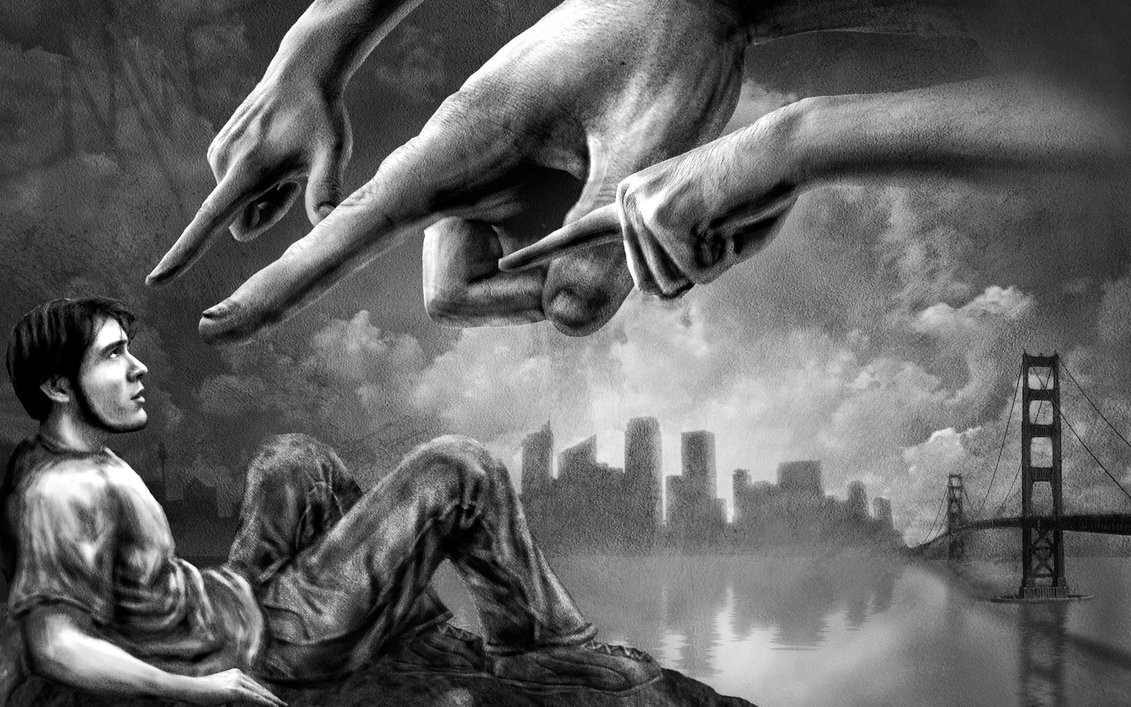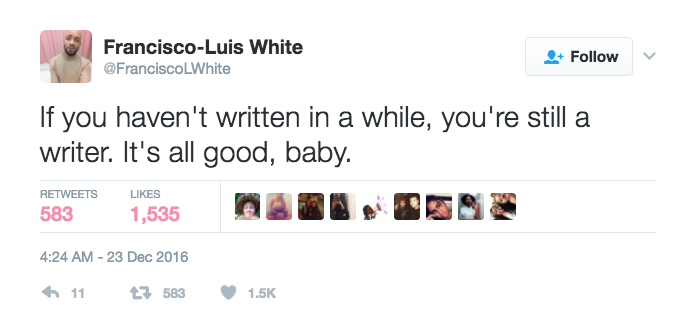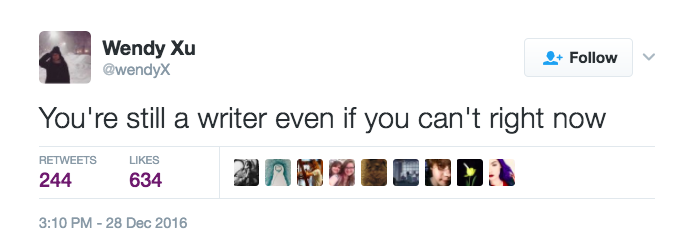This is a piece by Scarlett Harris, on writing and guilt.

I’m a guilty person. If I cancel plans, don’t go to the gym or call in sick to work, I spend most of the rest of the day (and sometimes longer) feeling guilty. The same can be said for writing or, rather, not writing.
As a part time freelancer, I feel that during time off from my day job I should always be writing. This doesn’t take into account the many tasks that don’t involve the actual production of words intended for public consumption, such as invoicing, researching and pitching, nor the times when I’m twiddling my thumbs waiting for a bunch of articles tied up in various stages of publication to drop or, to quote Natalie Imbruglia, inspiration has run dry. And sometimes I just need a day off for bingewatching reasons.
As a culture writer, I can usually justify a good bingewatch as research rather than procrastination from writing, if only very tangentially. But, trading part-time in opinion, reporting and features, I know that if I don’t write it, someone else will, sending me into a FOMO spiral with further exacerbates the guilt.
Even if I have no pieces in the pipeline I still think I should be writing, but I struggle with idle writing or writing for the sake of it.

Louise Allan, whose as-yet-untitled first novel will be published in September, is working on her second novel but is struggling with words that just won’t come.
“Four months in, I have barely anything to show for it…” she told me in an email. “I find these early days of a new novel the hardest—when I’m creating something from nothing and have no firm ideas about the people in my story or what will happen to them. I sit and try to write, but what comes out is rubbish and I feel as if I’m wasting my time. Sometimes, I feel I’d be better off tidying the house…—something with a palpable product to show for my efforts.”
Things like NaNoWriMo are great incentives to keep those writing cobwebs at bay and combat guilt, but I personally have no plans to venture into fiction, so it’s out of my wheelhouse.

Someone who has used NaNoWriMo to publish two—count ’em, two!—novels is Anna Spargo-Ryan, most recently the winner of the inaugural Horne Prize. I spotted a tweet from her recently about how she hadn’t pitched anything since last June (what with writing two books and what not), so I asked her how she deals with that.
“I have perpetual non-writing guilt,” Spargo-Ryan wrote to me. “It manifests in plucking sentences from thin air to narrate whatever I’m doing instead, as though reminding me that’s what I should be doing. I’ll stand in a supermarket queue and my inner monologue will be, ‘She stood in line. The man in front of her had six heads of broccoli and the long shaft of a leek.’ Sometimes the only way to allay the guilt is to sit in my car and write these sentences down on the backs of receipts, and pretend they will appear in a novel one day (often they do, but the non-writing guilt carries on regardless).”

Coming off the holiday break, there hasn’t been a lot of writing to be done with editors on holidays and content slowing right down as many readers unplug and go away, favouring paperbacks over hot takes. Putting the finishing touches on this piece in the lead up to Christmas, I still think I should be slaving over my laptop all day. Writing what, I don’t know, as I’m only on deadline for two other pieces in the New Year thus far. If the guilt is too much and we can’t enjoy this downtime, there’s always receipts to be filed and clips to be updated.
Writing this from America, there’s also an insidious guilt accompanying most writing that isn’t to do with the country’s political future in the wake of Donald Trump’s impending presidency. Among many of the writer’s groups I belong to, I’ve heard complaints of lacking the drive and inspiration to get back to what we wrote about pre-election, or shame surrounding putting lightheaded or potentially frivolous things out there when many people are fearing for their autonomy, livelihoods and, indeed, lives. And then there’s Aleppo. And the refugee crisis. And deaths in custody. These tragedies really give new meaning to the concept of writer’s guilt and how silly shame over not writing can seem in comparison. Perhaps we can take these negative emotions and use them to do good in our downtime from writing by volunteering to mentor young writers or write press releases for non-profits?
Writing this, I’ve realised that my guilt is more to do with the idea of what it means to be a writer rather than the practicalities of the trade. Like anything, the inspiration and demand for writing comes in ebbs and flows. The sooner we come to grips with that, the sooner we can be less guilty writers.

Allan agrees, telling me that procrastination, story ideas written on scraps of paper and feeling guilty about the lack of word flow is “how writing works. [T]hese fallow hours aren’t wasted. That what I’ve written is developing the story, even though it doesn’t feel like it… The groundwork is being laid and my subconscious is working all the time.”
As a part-time writer, there’s only so much #content to be pitched and published. The sooner all writers come to this understanding, the sooner we can focus on perfecting the work we can put out into the world.
For a little inspiration and a guide to finding the right place for you to pitch and publish check out our personalised career service Bloc Boost.
Scarlett Harris
Scarlett Harris is a regional Victoria-based freelance writer, musing about femin- and other -isms.



